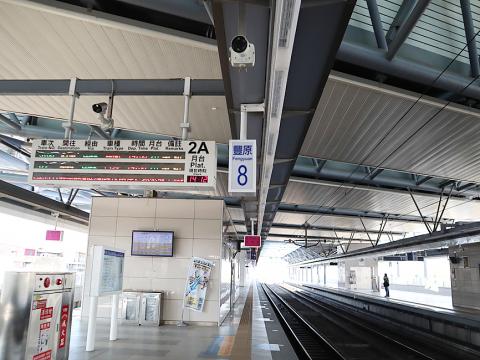The Taiwan Railways Administration (TRA) yesterday said that it would not activate the facial-recognition feature of its new smart surveillance system after lawmakers voiced their concerns over privacy issues.
The railway operator on Tuesday announced that it would soon start testing a smart surveillance system at Fengyuan Railway Station in Taichung.
The company said that the system would be mainly used to ensure the safety of passengers in and around railway stations — including detecting any intrusion onto the railway tracks and other restricted areas, abnormal loitering of individuals on the platforms or inside buildings, and suspicious packages — but lawmakers raised concerns that the facial-recognition technology would infringe on people’s privacy.

Photo: Ou Su-mei, Taipei Times
Chinese Nationalist Party (KMT) Legislator Ko Chih-en (柯志恩) said that the Democratic Progressive Party (DPP) administration has been critical of China for abusing human rights through the use of facial-recognition systems.
Ko asked if the administration of President Tsai Ing-wen (蔡英文) had learned from China by installing the technology to control the public.
DPP legislators sparked controversy in 2017 when they proposed a change to the Household Registration Act (戶籍法) that would legalize the use of iris-recognition systems by offices, Ko said.
The KMT caucus would have strongly opposed the use of facial-recognition technology if the TRA did not acceptably define the conditions under which the technology would be used, Ko said, adding that she was glad that it had decided not to activate the functionality.
KMT Legislator Jason Hsu (許毓仁) said that the Hollywood movie Enemy of the State shows how a government could control people through the mass collection of data and monitoring their whereabouts using surveillance devices.
“China has used surveillance devices to enforce a social credit rating system, while Hong Kong uses the devices to monitor pro-democracy protesters. Is it not strange that what DPP is planning to do is also what China is doing?” Hsu said.
Constitutional interpretations by the Council of Grand Justices have determined that the police cannot stop and frisk individuals without a legitimate reason, and that people have the right not to be monitored in public places, Hsu said.
However, the facial-recognition technology would enable the government to monitor people closely, like “watching goldfish in a transparent fish tank,” he said.
Following the criticism, the Taiwan Railways Administration said that it would not activate the facial-recognition technology, nor would the Railway Police Bureau.
“We will continue to build an environment that is friendly to all railway passengers while ensuring the safety of the transportation system,” the company said.

UNITED: The premier said Trump’s tariff comments provided a great opportunity for the private and public sectors to come together to maintain the nation’s chip advantage The government is considering ways to assist the nation’s semiconductor industry or hosting collaborative projects with the private sector after US President Donald Trump threatened to impose a 100 percent tariff on chips exported to the US, Premier Cho Jung-tai (卓榮泰) said yesterday. Trump on Monday told Republican members of the US Congress about plans to impose sweeping tariffs on semiconductors, steel, aluminum, copper and pharmaceuticals “in the very near future.” “It’s time for the United States to return to the system that made us richer and more powerful than ever before,” Trump said at the Republican Issues Conference in Miami, Florida. “They

GOLDEN OPPORTUNITY: Taiwan must capitalize on the shock waves DeepSeek has sent through US markets to show it is a tech partner of Washington, a researcher said China’s reported breakthrough in artificial intelligence (AI) would prompt the US to seek a stronger alliance with Taiwan and Japan to secure its technological superiority, a Taiwanese researcher said yesterday. The launch of low-cost AI model DeepSeek (深度求索) on Monday sent US tech stocks tumbling, with chipmaker Nvidia Corp losing 16 percent of its value and the NASDAQ falling 612.46 points, or 3.07 percent, to close at 19,341.84 points. On the same day, the Philadelphia Stock Exchange Semiconductor Sector index dropped 488.7 points, or 9.15 percent, to close at 4,853.24 points. The launch of the Chinese chatbot proves that a competitor can

TAIWAN DEFENSE: The initiative would involve integrating various systems in a fast-paced manner through the use of common software to obstruct a Chinese invasion The first tranche of the US Navy’s “Replicator” initiative aimed at obstructing a Chinese invasion of Taiwan would be ready by August, a US Naval Institute (USNI) News report on Tuesday said. The initiative is part of a larger defense strategy for Taiwan, and would involve launching thousands of uncrewed submarines, surface vessels and aerial vehicles around Taiwan to buy the nation and its partners time to assemble a response. The plan was first made public by the Washington Post in June last year, when it cited comments by US Indo-Pacific Commander Admiral Samuel Paparo on the sidelines of the Shangri-La Dialogue

MARITIME SECURITY: Of the 52 vessels, 15 were rated a ‘threat’ for various reasons, including the amount of time they spent loitering near subsea cables, the CGA said Taiwan has identified 52 “suspicious” Chinese-owned ships flying flags of convenience that require close monitoring if detected near the nation, the Coast Guard Administration (CGA) said yesterday, as the nation seeks to protect its subsea telecoms cables. The stricter regime comes after a Cameroon-flagged vessel was briefly detained by the CGA earlier this month on suspicion of damaging an international cable northeast of Taiwan. The vessel is owned by a Hong Kong-registered company with a Chinese address given for its only listed director, the CGA said previously. Taiwan fears China could sever its communication links as part of an attempt